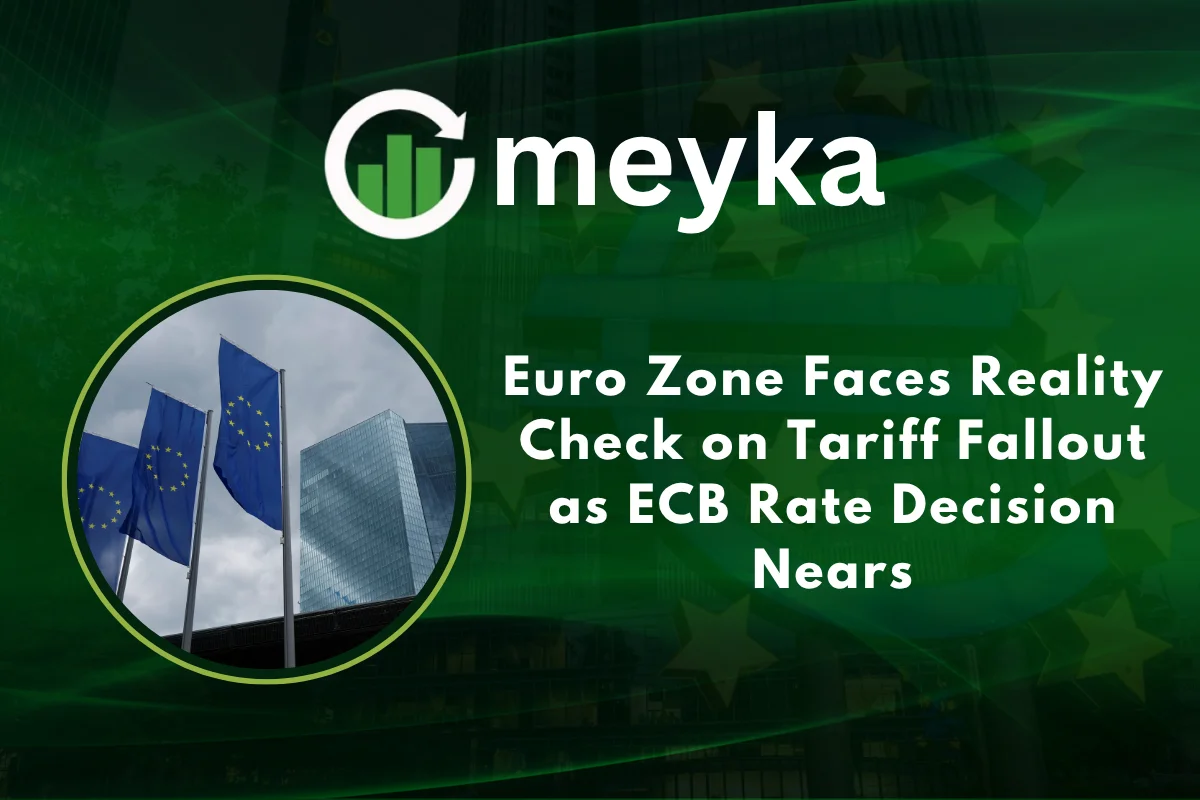Euro Zone Faces Reality Check on Tariff Fallout as European Central Bank Rate Decision Nears
As the European Central Bank (ECB) gears up for its upcoming rate decision, the Euro Zone is confronting the real effects of global trade tensions and tariff disruptions. While inflation is moderating, growth risks are mounting, and the intersection of tariffs, export headwinds and investor caution is reshaping the outlook for the region’s economy and the broader stock market.
Tariff Pressure and Growth Risks in the Euro Zone
The Euro Zone has long enjoyed strong export performance, interconnected supply-chains and stable inflation. But new tariff measures, uncertainty around trade relations and shifting global demand have unsettled the region’s economic engine. According to the ECB’s own account of its April meeting, developments reflected “both the negative fallout from tariffs and lower commodity prices.”
Tariffs directly affect the Euro Zone via three main channels:
- Higher input costs for businesses exporting goods, especially in sectors like manufacturing and machinery.
- A weaker export outlook, as trade partners impose retaliatory measures or demand softens.
- Financial market volatility, as investors revise growth assumptions and corporate earnings forecasts.
These pressures are especially important amid a global shift toward technology, supply-chain re-routing and cost pressures. Thus, for those doing stock research, noticing how trade risk interplays with monetary policy, growth and inflation is essential.
Monetary Outlook: What the ECB Is Watching
With tariffs stressing the economy, the ECB finds itself balancing a delicate act. Inflation in the Euro Zone softened to 2.2% in March, a four-month low. But the bank’s caution is clear: while inflation is trending down, growth risks from trade and global demand are on the rise.
Investors expect the ECB to take a meeting-by-meeting approach, signalling flexibility but offering little certainty. In its July meeting, the ECB held interest rates steady at 2% and explicitly flagged trade uncertainty as part of its caution.
From a stock market perspective, this means the monetary policy environment in the Euro Zone remains fluid. Companies exposed to trade flows, especially export-oriented firms, will be sensitive to rate decisions and currency shifts.
Impact on Finance, Trade & Investment Sentiment
Export-oriented firms face tighter headwinds
Euro-area firms are reporting lower profits even while they remain broadly optimistic. A recent ECB survey noted that although investment expectations improved, margin pressure and inflation expectations held at elevated levels.
Stock market and investor caution
When trade risks rise, equity markets react. Investors doing stock research are increasingly asking: Are companies exposed to tariffs, supply-chain disruption or foreign demand weakness? And are they resilient against currency shifts or inflation surprises?
The higher cost of trade, the stronger euro (which dampens export competitiveness), and the threat of further tariff escalation combine to dampen the growth narrative in the Euro Zone.
Monetary policy signalling and expectations
With inflation easing yet growth threatened, the ECB may lean toward caution over aggressive rate cuts. Some analysts had expected cuts as insurance against tariffs, but uncertainty remains.
Hence, for global investors, the Euro Zone’s monetary stance is significant. A misstep could ripple through global markets, particularly those trading Euro-zone export firms or banks, and even tech firms linked to supply chains or AI-enabled manufacturing.
Why the Tariff Fallout Matters Now
Trade tensions are not distant threats, they are shifting priorities in 2025 for the Euro Zone. The ECB’s internal documents note that the tariff announcements triggered sharp equity market corrections and currency swings.
Some key reasons this matters now:
- Supply-chain disruption: Tariffs disrupt input flows, raise costs, and force firms to adjust sourcing and logistics.
- Currency strength: The euro has appreciated in part due to portfolio shifts toward European assets, which makes exports less competitive.
- Export-dependent economy: Many Euro Zone economies rely heavily on external demand. A slowdown in trade impacts growth more than in inward-looking economies.
- Financial risk: Investor risk appetite may dampen if trade uncertainty persists — this matters for banks, equity markets, and corporate credit.
In short, these trade-related stresses are feeding into both the real economy and the financial economy.
What the Rate Decision Could Signal
As the ECB’s decision day approaches, investors and analysts will watch for:
- Forward guidance: Will the ECB hint at rate cuts, pauses or even cater for upside inflation risks?
- Growth vs inflation emphasis: If tariffs and trade risk dominate, growth may become the focus rather than inflation.
- Currency commentary: A strong euro complicates export growth, any signals here will matter.
- Market reaction: Stocks in export-heavy sectors may move sharply. Firms tagged as part of the “future economy” (including those in data, AI or supply-chain tech) could see differentiated impact.
For those doing stock research, this is a critical moment. If the Euro Zone monetary policy shifts too slowly in the face of trade risk, export-sensitive stocks could underperform. Alternatively, companies with robust domestic focus or minimal export exposure may fare better.
Investor Considerations in the Stock Market Context
- Sector dispersion matters: Not all companies are equally exposed to tariffs or trade-chain disruption. Look at supply-chain maps, export-dependence and currency sensitivity.
- Tech & AI overlap: Some firms in the Euro Zone integrate AI-driven manufacturing, logistics optimisation or cloud infrastructure, these may benefit even amid trade headwinds. They straddle both export risk and tech growth themes.
- Monetary policy risk: Rate decisions influence borrowing costs, investment and risk appetite, all relevant for equity valuations.
- Currency risk: A stronger euro squeezes exporters. Firms with pricing power or less exposure may be more resilient.
- Geopolitical/trade policy risk: Tariff announcements are unpredictable. Scenario-planning matters more than ever.
Conclusion
The Euro Zone is at a moment of truth: the tariff fallout is real, and the European Central Bank must weigh growth risk against inflation control, while global trade dynamics shift dramatically. For investors, especially those doing stock research in the stock market, monitoring the ECB’s signals, export-risk exposure and corporate resilience is vital. The decisions made now will set the tone for Europe’s economic path in the near term and for firms, sectors and markets tied to the Euro Zone’s trade-driven economy.
FAQs
Because tariffs and trade disruptions pose a risk to growth, investment and exports in the Euro Zone. Although inflation is easing, weaker growth and trade stress can lead to slower momentum, which may necessitate monetary-policy support. The ECB’s meeting account noted the negative fallout from tariffs and lower commodity prices.
A rate decision influences borrowing costs, investment and business-confidence. For export-heavy companies, the interplay of a strong euro, weaker demand and higher costs due to tariffs can squeeze margins. For tech or AI-related firms, shifts in policy and currency can affect valuations and risk appetite.
Key indicators: guidance on future rates, commentary on trade and currency, inflation vs growth emphasis, and data on exports and business sentiment. Firms exposed to trade, supply chains or export markets should be monitored closely for risk as well as opportunities.
Disclaimer:
The content shared by Meyka AI PTY LTD is solely for research and informational purposes. Meyka is not a financial advisory service, and the information provided should not be considered investment or trading advice.






